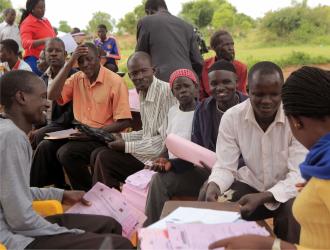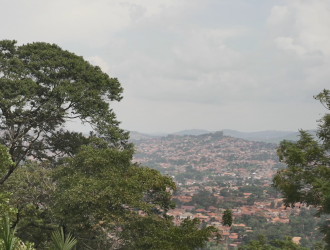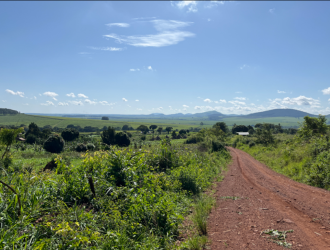In the interests of transparency, TotalEnergies discloses key progress indicators for the Tilenga and EACOP projects in Uganda and Tanzania, regarding land acquisition, biodiversity, local content and operations.
Tilenga and EACOP: Key Project Progress Indicators

Tilenga and EACOP: Key Project Progress Indicators
Tilenga and EACOP: Key Project Progress Indicators
-
Land acquisition
-
Biodiversity
-
Local Content
-
Operations
Like many infrastructure construction projects worldwide, the Tilenga and EACOP projects require land acquisition.
This process is undertaken by TotalEnergies and EACOP on behalf of the Ugandan and Tanzanian governments and is carried out in accordance with the stringent standards of the International Finance Corporation (IFC), a subsidiary of the World Bank, aimed at ensuring compensation for affected populations.
Resettlement Action Plans have been developed in collaboration with relevant authorities and local stakeholders. These plans outline the procedures and measures to be followed to mitigate potential negative effects, compensate for losses, for affected people by the projects.
The projects required the acquisition of 6,400 hectares of land, impacting 19,262 households, including everyone with assets impacted by the project, such as permanent or temporary structures or an economic activity.
Out of the 19,262 affected households, 767 households (around 5,000 people) reside on the affected land and are relocated on better conditions.
Where do we stand as of January 31st, 2026?
Regarding the participation in the process by affected households:
Programs aimed at supporting the affected households have all been launched. They include the following components:
- distribution of food baskets over a fixed period. This transitional support is provided for a period of 6 – 12 months depending on the level of impact;
- support for a minimum of three seasons under a program called "Livelihoods Restoration Program". Launched after the property transfer and is based on the following pillars:
- training in agriculture-related activities (improving cassava crop yields, vegetable cultivation, tree planting/commercial nursery, beekeeping, livestock improvement);
- support in vocational training and finance management;
- assistance in the development of small businesses.
What about households that haven’t signed compensation agreements?
As a reminder, for the Tilenga project, all the PAPs who had not yet signed compensation agreements were subject to the Court Application. 42 PAPs owning/claiming ownership rights in 32 land parcels, i.e. 0.8% of all PAPs concerned were affected by the court application. Among the 32 land parcels in litigation, 17 presented asset valuation grievances, 18 had land ownership disputes amongst themselves (and the Project could not determine the rightful party to receive payment) and 7 were absent/unreachable.
Several meetings were organized to reach an agreement. Faced with the impasse resulting from the refusals, the matter was taken to court by the Ugandan government represented by the Attorney General following a request from the Ministry of Energy and Mineral Development.
At a hearing held on December 8, 2023 in the Ugandan town of Hoima (where part of the land affected by the Tilenga project is located), the High Court ruled in favor of the Ugandan government. It also decided to grant the owners concerned the right to file individual claims against the Ugandan government if they contested the value of the compensation awarded by the Chief Government Valuer.
The compensation was paid to the court as directed by the Court Order on December 22, 2023. Notices to vacate were issued to the individuals by the Government and the process is now finalized; the parcels have been transferred to the Tilenga Project.
The implementation of these decisions is the sole responsibility of the Ugandan government.
Regarding EACOP in Uganda, 103 PAPs were in an acquisition process similar to the Tilenga project. EACOP has received regarding these PAPS, the report from the Ugandan Government appointed an Assessment Officer and is implementing its recommendations. The process is about to be closed with 99,3% of the compensation agreements signed and 99,2% paid.
In Tanzania, 48 PAPs out of 9,927 have not signed the compensation agreements. Most of these PAPs are either absent, or unknown or going through inheritance or dispute resolution processes within their families. Compensation is paid into a dedicated non-judicial escrow accounts and a claim process has been agreed with the Tanzanian Authorities.
What are the next steps?
These are mainly based on:
- continuing to support households through the Livelihood Restoration Program;
- finalization of the land acquisition process by the Ugandan and Tanzanian authorities.
Uganda has made a strategic decision to exploit its oil resources, awarding the Tilenga field to TotalEnergies and the Kingfisher field to a Chinese company, CNOOC.
The Tilenga project is based in the Lake Albert region of Uganda (mainly the Buliisa and Nwoya Districts). After start up, it will produce up to 190,000 barrels of oil per day to meet global demand. Uganda, a landlocked country with no access to the sea, has joined forces with Tanzania to enable oil production to be transported and exported. This will be done through the EACOP (East African Crude Oil Pipeline) project, which involves the construction of a 1,443 km fully buried pipeline between the city of Kabaale in Uganda and the port of Tanga in Tanzania, as well as a storage terminal and a loading jetty in Tanga.
Part of TotalEnergies Exploration and Production Uganda (TEPU) and EACOP activities will be in sensitive areas. Both companies are entirely aware of the sensitive environment in which they operate and continue to follow the mitigation hierarchy with respect to managing impacts (i.e. avoid, reduce and compensate) with the aim of achieving positive outcomes for biodiversity and communities.
Regarding the Tilenga project, TEPU has chosen to restrict the project’s permanent footprint inside the Murchison Falls National Park in Uganda. The permanent footprint requires less than 0.03% of the park’s surface area.
TEPU has initiated the process of implementing the Biodiversity Ecosystem Services Action Plan which aims to achieve net positive impact. It has four key pillars to help protect and enhance the biodiversity of the Albertine Region. In practice, this means by 2045:
- increasing the populations of key indicator species (lions and elephants) by 25% within Murchison Falls Protected Area;
- maintaining the populations of antelopes (Lelwel Hartebeest, Uganda Kob), Nubian Giraffe;
- protect and enhance the integrity of important habitats through invasives species management;
- restoring 500 ha of degraded wetlands, 1,000 ha of degraded forests and protecting 10,000 ha of remaining forest within the forest corridor.
Regarding EACOP, the pipeline route was finalised based on a rigorous review of environmental, biodiversity and social constraints. It does not cross any Ramsar or IUCN (International Union for Conservation of Nature) sites and is mainly located on agricultural land or unused or even uninhabited land.
Where do we stand as of Januray 31st, 2026?
Both TEPU and EACOP have conducted a Critical Habitat Assessment (CHA) and are in the process of implementing Management Plans that are designed to identify, offset and monitor and evaluate the residual impacts on the natural and critical habitat of the projects with the overall objective of having net positive impacts for biodiversity and ecosystem services.
Such activities require working with Governments of Uganda and Tanzania to help improve the management of protected areas such as MFNP, Budongo Forest Reserve, Wambabya Forest Reserve, Bugoma Forest Reserve and Taala Forest Reserve.
These action plans are implemented in partnership with local communities, conservation organizations and government mandated institutions and are a long-term commitment (25 years). Furthermore, these activities are overseen by an independent panel of experts (the Independent Biodiversity and Livelihoods Advisory Committee, IBLAC, comprising international and national specialists) who provide advice and support for implementation of environment and social activities in line with the International Finance Corporation (IFC) Performance Standards.
Three programs have been launched by TEPU: the Murchison Falls Conservation Program, The Wetlands Conservation Program and the Forest program. Pilot projects have been initiated under each program to experiment and build on lessons learnt to scale up.
The Murchison Falls Conservation Program is based on:
- patrol Effectiveness Pilot with the Uganda Wildlife Authority (UWA) and the NGO, Wild Conservation Society (WCS) with the removal of 7,592 snares (10,197 for both phases 1 and 2) and the training of 115 UWA rangers (177 for both phases). In February 2024 commenced Phase II snare removal and improving patrol effectiveness in MFPA program with the Wildlife Conservation Society and the Uganda Wildlife Authority;
- the removal of spots of invasive species. At date, 43,365 spots have been removed, over the annual target of 3,510 spots;
- contributing to key research by funding a program in partnership with Makerere Uganda University;
- completing the Management Effectiveness Assessments against International Union for Conservation of Nature (IUCN) Green List for Bugungu and Karuma Wildlife Reserves.
The Wetlands and Forests programs are based on:
- a wetland survey to study critical habitat qualifying species on Lake Albert fringe wetlands & Murchison falls Albert Delta Ramsar;
- the signature of an MoU with the Ugandan Ministry of Water and Environment to conserve and restore wetlands;
- the signature of an MoU with National Forestry Authority to conserve Budongo Central Forest Reserve;
- the completion of a Conservation Education Program with Chimpanzees. Lessons rolled out across 9 schools with participation of over 2,800 pupils;
- the completion of a Restoration Program with a local NGO, Ecotrust with 140,000 trees seedlings planted across 350 ha of degraded forest corridor.
Regarding EACOP, the potential impacts associated with the 30-metre-wide pipeline corridor were assessed and resulted in regulatory approved Environmental and Social Impact Assessments (ESIA) for the Ugandan and Tanzanian sections. In parallel, an International Finance Corporation (IFC) Performance Standard (PS) 6 (Biodiversity Conservation and Sustainable Management of Living Natural Resources) compliant Critical Habitat Assessment (CHA) was conducted.
To achieve PS6 compliance, the CHA was conducted in both the marine and terrestrial environments to determine the presence, distribution and extent of Natural Habitat and Critical Habitat. To further avoid and minimize biodiversity impacts and to provide guidance for the offsetting scenarios the following PS6 associated plans were developed:
- the Biodiversity Action Plan (BAP). It details the approach for achieving No Net Loss for Natural Habitat and Net Gain for Critical Habitat and the features they support;
- the Biodiversity Offset Management Plan (BOMP). It presents the actions that will be taken to meet commitments under national regulations and IFC PS6;
- the Biodiversity Monitoring & Evaluation Plan (BMEP). It tracks the effectiveness of management controls and status of biodiversity values.
The Tilenga and EACOP projects are also engaging with the IUCN Avoid Reduce Restore Conserve (ARRC) taskforce on great apes to support the development of a landscape management plan for the Eastern chimpanzee.
What are the next steps?
TEPU plans to scale-up the conservation activities to further work towards our goal of leaving Murchison Falls Protected Area and the surrounding landscape in better condition than if the project had not taken place. This will include:
- continue to support research and development through monitoring of specific species such as elephants, giraffes, lions, hyenas and vultures in MFPA to identify any impacts to Wildlife during the development of oil and gas facilities to inform adaptive management;
- working towards implementing the integrated collaborative management partnership for Murchison Falls Protected Area. This long-term agreement shall support the efforts of the Uganda Wildlife Authority in partnership with an implementing organization to improve management of the Protected Area;
- launch of the Phase II of corridor restoration program targeting approx. 173 ha of degraded forest in partnership with Ecotrust and the Communal Land Associations.
EACOP priorities will rely on (non-exhaustive):
- implementation of the EACOP Chimpanzee Action Plan that includes conservation education with a focus on chimpanzee and a study of infrastructure developments on ranging behavior;
- NH reinstatement and conservation of a section of Taala CFR that has mostly been converted for human use will commence;
- Wetland rehabilitation in the Rwizi River water shed and conservation of the associated grey crowned crane population;
- support for the development of:
- a management plan for the Burigi Chato National Park and conservation program for the endangered ashy red colobus;
- identification of a section if a unique floral assemblage, Itigi, thicket and commence restoration;
- implementation of a Species Action Plan for the critically endangered pancake tortoise;
- in Tanga, work with local communities on mangrove conservation and coral reef restoration;
- the second phase for the implementation of an offset program for the endangered Indian Ocean humpback dolphin;
- a humpback whale telemetry project that can follow the whales’ global movements.
For both projects the offset programs are designed so they can and will be sustained over the estimated projects’ lifespan of 25 years.
Uganda's Lake Albert region is rich in oil resources. Uganda has made a strategic decision to exploit these resources, through the Kingfisher, the Tilenga and the EACOP projects, in order to generate the jobs, infrastructure and financial resources needed for the country's development.
The projects have each been the subject of a detailed local content plan covering local employment, local sourcing of goods and services and local skills development. These plans have been submitted to and approved by the national authorities.
Overall, an estimated USD 1.2 billion will be directly spent with local contractors during the construction phase for both the Tilenga and EACOP projects. This amount, which is equivalent to two years of foreign direct investments in Uganda, will generate a very significant socio-economic impact.
The Tilenga and EACOP projects are expected to base the selection of the provision of local goods and services on a transparent and competitive tendering. A specific list of goods and services, so called “reserved contracts” shall favour national and local companies.
The Project’s contractors are committed to respect the projects’ values, such as the Human Rights, the Anti-Bribery Policy and the Projects’ safety standards. To fulfil these commitments, they are embedded in the contracts and training sessions for the Company’s contractors are being organized. Particular attention is paid to setting up an independent worker grievance mechanism.
The Tilenga and EACOP projects will benefit the local populations by generating at peak of mobilization, close to 18,000 direct jobs and 60,000 indirect jobs for Ugandan and Tanzanian nationals during the construction phase. The projects give priority to local and national employees in all their operations. All contractors promote employment and exceed minimum employment requirements defined by applicable laws.
Approximately 3 million hours of training will be delivered to local/ national workers across the two countries in technical areas and also on the Project’s ethical values in order to promote Tilenga and EACOP integrity standards. 40% of the technical capabilities developed through this training are expected to be directly applicable to other industries and projects (e.g. truck drivers, welders).
Where do we stand as of January 31st, 2026?
The construction phase has generated the creation of 28,383 direct jobs exceeding the initial target of 15,330. Regarding the amounts and benefiting to Ugandan and Tanzanian businesses, USD 1,7 billion have been spent locally, representing 134% of the expected local expenditures. For the training, 3 million hours have been delivered over a target of 2,3 million.
In addition, various CSR and capacity building activities have been implemented.
For Education and Training:
In the field of education and training:
- TotalEnergies EP Uganda (TEPU), operating the Tilenga project, has offered national and international scholarships to 343 students to attend courses mainly in the fields of science, technology, information and communication sciences;
- more than 1,000 students have taken some twenty courses in science, technology and information and communication sciences as part of the TotalEnergies Associate Professors (TPA) program conducted in partnership with Makerere University in Uganda. In addition, 13,000 young Ugandans participated in the Tilenga MOOC (Massive Open Online Course), consisting of six online courses accessible to all;
- TEPU selected 200 young Ugandans from the Tilenga MOOC. These young people joined the Tilenga Academy training program aimed at giving them the international skills and certifications to work on the Tilenga project during the production phase. Selected candidates undergo a 2.5-years training;
- TEPU has also launched a program to build the capacity of suppliers in the region. More than 3,300 Ugandans participated in 48 sessions, consisting of workshops, trainings, matchmaking, etc;
- TEPU has launched the "Industry Enhancement Center (IEC)" project. This pioneering initiative aims to build the capacity of Ugandan small and medium-sized enterprises (SMEs) and enable them to participate in the oil and gas sector and beyond in the long term.
EACOP is also involved in the field of education and training in:
- selecting 34 young Ugandans from the MOOC Tilenga and 114 young Tanzanians from the MOOC EACOP to join the EACOP Academy training program aimed at giving these young people the skills and international certifications to work on the EACOP project during the production phase. Selected candidates will receive 2.5 years of training;
- launching an internship program with about 70 graduate internships from Tanzania and Uganda;
- launching a "train-the-trainer program". It is a dedicated program in which trainers from different universities, colleges and vocational schools are trained with a view to strengthening their qualifications in different disciplines. By the end of 2024, more than 100 instructors had been trained.
Utilities: access to water and electricity:
- more than 4,000 people in Buliisa (area of the project) now have better access to drinking water thanks to the boreholes built by TEPU. This particularly benefited women and girls who previously had to walk between 5 km and 10 km there and back to fetch water. In addition, more than 10,000 cattle now have access to drinking troughs;
- for access to electricity, two MOU to develop Renewable electricity projects, have been signed with both Uganda (1 GW, first projects for 60 MW) and Tanzania (Solar Park: 115 MW and 100 MW wind farm under study);
- besides, TEPU offered 8,000 solar lamps to the local communities.
Health:
- at Anaka Hospita (district hospital), TEPU renovated twelve housing units that had been destroyed by storms;
- TEPU also supported the rebuilding of the Avogera health center in Buliisa District. This facility offers quality primary medical care to all residents of the Avogera region (about 2,000 households). The building has been fitted with solar panels for its energy supply;
- in August 2023, TEPU financed the development of the emergency medicine training center of Makerere University located on the premises of the Mulago National Referral Hospital in Uganda. This center provides specialized training in emergency medicine to Ugandan practitioners.
All these actions underline TEPU and EACOP commitment to making this project an example of sharing prosperity and value creation in Uganda and Tanzania.

Uganda has made a strategic decision to exploit its oil resources, awarding the Tilenga field to TotalEnergies and the Kingfisher field to a Chinese company, CNOOC.
The Tilenga project is based in the Lake Albert region of Uganda (mainly the Buliisa and Nwoya Districts). After start-up, it will produce up to 190,000 barrels of oil per day to meet global demand. The project involves developing six fields and drilling 420 wells at 29 locations. The production will be transported through buried pipes to a Central Processing Facility (CPF), built at Kasenyi and where the fluids (oil, water, gas) will be separated and treated.
Uganda, a landlocked country with no access to the sea, has joined forces with Tanzania to enable oil production to be transported and exported. This will be done through the EACOP (East African Crude Oil Pipeline) project, which involves the construction of a 1,443 km fully buried pipeline between the city of Kabaale in Uganda and the port of Tanga in Tanzania, as well as a storage terminal and a loading jetty in Tanga. The pipeline will have six pumping stations: 2 in Uganda powered by the national grid and 4 stations in Tanzania powered by the local grid and together with a solar power plant at the Tanga Terminal. It also includes a thermal insulation and heat tracing heating system.
Tilenga’s oil needs to be kept above 50°C during transit because of its characteristics. At full flow condition, the EACOP pipeline will not need to be heated, the pipeline insulation acts as a “thermos flask”, keeping the oil inside warm and the environment outside cool. Latest technologies are being deployed to ensure the safety and integrity of the pipeline (including fiber optics for control and monitoring). The pipeline route has been designed to avoid areas of environmental interest as much as possible. It does not cross any Ramsar zone or IUCN (International Union for Conservation of Nature) sites and is mainly located on agricultural land or unused or even uninhabited.
Where do we stand as of January 31st, 2026?
For the Tilenga project, the construction phase of all the main components is ongoing: drilling, facilities construction, flowlines and roads construction.
The drilling activities are ongoing with the completion of 11 wellpads with 178 wells drilled. As a reminder, three rigs are currently used. Two rigs are currently operating in the Murchison Falls National Park (MFNP). The other is located outside it, in the South of the Victoria Nile in sparsely populated rural areas where the activities are essentially agricultural.
The construction of the CPF (Central Processing Facilities) is progressing with the installation of the main equipment and the welding of the pipes.
The Tilenga Development is carried out according to the highest environmental and social standards.
Therefore, the IFC (International Finance corporation) Performance Standards on Environmental and Social Sustainability are applied to the development, in addition to all applicable Ugandan legislation. A Best Available Technology (BAT) approach is employed, and the process and associated facilities are designed to comply with these standards. The project is designed to minimize any potentially harmful impacts to the environment.
Regarding EACOP, the construction works are on-going with:
- the production of Insulated linepipes at the thermal insulation plant in Tanzania is completed and the decommissioning of the plant started;
- the pipeline installation in both Uganda and Tanzania is ongoing. As of 31st January 2026, more than 1,400 km pipelines have been welded, and more than 500 km have been laid and buried. HV cable installation is also ongoing at the EACOP RoW;
- the construction of the accommodations camps at the Main Camp and Pipe Yards (MCPYs) in both Uganda and Tanzania, is nearly completed, with 16 camps operational to accommodate project workforce;
- the civil and foundation works at all the Pumping stations in Uganda and Tanzania which are completed. Structural erection and piping installation are ongoing at those locations;
- the civil works at the Tanga Terminal are completed and erection of structure and piping are ongoing. The erection of storage tanks is structurally completed and they have been all successfully hydrotested;
- offshore activities at Tanga Export jetty are currently consisting in the installation of Mooring and berthing dolphins.
EACOP Ltd and TEPU are committed to developing the Project in a sustainable and responsible manner with the goal of minimizing environmental impacts and in compliance with international, regional, and national laws, regulations and standards, always applying the most stringent. Best industry practices and Best Available Techniques (BAT) with regards to discharges to air, land, groundwater, surface water, noise and waste generations, are applied, including for energy efficiency optimization and greenhouse gas (GHG) emissions minimization.
What are the next steps?
For the Tilenga project, the coming months will be dedicated to the continuity of the drilling phase with the three active rigs, together with all construction activities in the CPF, the wellpads, the flowlines and the installation of the offshore platform in the Lake Albert.
Regarding EACOP, most of the actions will be focused on the continuation of the construction activities at the Pumping stations and Tanga terminal facilities.







